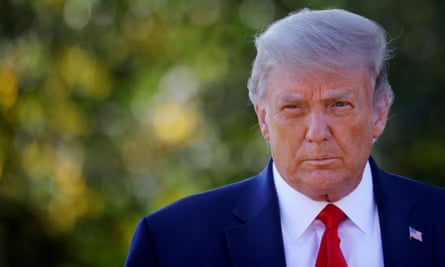Extract from The Guardian
Donald Trump has tested positive for Covid-19 – but what happens if he can’t carry out his presidential duties?
- Trump tests positive for coronavirus – latest updates
- Trump tests positive: what we know and don’t know

Last modified on Sat 3 Oct 2020 04.39 AEST
What happens if Trump is incapacitated?
Under the 25th amendment to the US constitution the president himself – or the vice-president with the agreement of eight cabinet officers, supported by Congress – can ask the vice-president, in this instance Republican Mike Pence, to take over as acting president.
Adopted by the US Congress in 1967 after John F Kennedy’s assassination, the 25th cleared up a vagueness in the constitution over succession in event of resignation, death or conviction in impeachment.
The least tricky part of the amendment is section 4, which stipulates what would happen should Donald Trump be indisputably physically debilitated either from an injury or ailment, so much so that he couldn’t communicate but remained alive.
Then the vice-president is in charge unless and until the president recovers.
If Pence is also unable to assume control, then under the constitution powers are delegated to the speaker of the House of Representatives, in this case, Nancy Pelosi, the Democratic California congresswoman. In the US Congress, the Democrats currently control the House, while the Republicans are in a majority in the Senate.
What are the implications for the election and its aftermath?
Here we get into murkier territory.Some Americans have already begun casting their ballots in early voting before official election day, which is 3 November, including overseas residents and those in states that permit early voting.
After the election, what happens if a president-elect dies during the lame duck period when the current presidential term is not over and the next president is officially inaugurated on 20 January? Under the constitution’s 20th amendment the vice-president would become president. The question of who would be declared the president-elect to be inaugurated to the position on 20 January would involve discussions and probably battles at state, party, electoral college and court level.
In a worst-case scenario involving death or permanent incapacitation before the election, the US would face an unprecedented electoral crisis.
Unlike in some other countries – such as the UK – Americans vote for an individual on the ballot for president, not for a party. For example there may be Republican and independent voters in this circumstance who would reject Trump but would be happy to vote for Pence, if he were the candidate.
Therefore in circumstances where Trump was taken off the ballot the vote would become deeply undemocratic, as Pence was never voted on as the presidential nominee via the process of primaries, which took place in the spring.
It is worth reiterating we are nowhere near that stage at the moment, this is about theoretical procedure in US politics, and that although Trump has tested positive, there is little information on his current condition and no prognosis.
What if Joe Biden also became ill?
In either case the party’s national committee, Republican or Democratic, would have to meet to formally nominate a new candidate. While that should be straightforward – seeing the vice-presidential candidate elevated – other candidates who were in the running in the primary stage could theoretically make a case for a hearing from their party.
It is also complicated by the fact that electors to the electoral college at state level – a controversial layer of 538 representatives across the US who vote for the president based on the result of the popular vote in their state – would have to decide if votes already cast for a dead or incapacitated candidate would “bind” them to any replacement when the electoral college meets after the election, in December.
What about postponement?
The date of US elections is fixed in law – going back to 1845 – and elections have gone ahead through war and crisis. Trump has himself been dismissed by Republicans for even suggesting a postponement because of the coronavirus pandemic.
The law says US voters must go to the polls on the Tuesday after the first Monday of November every four years. This year that date is 3 November.
It would take an act of Congress – ie approved by by both the House and Senate – to change that.
What’s the worst-case scenario?
There are potentially many. Biden has also been close to Trump recently and would be in a high-risk group, but he, like Pence, has said he has tested negative.
Both are on the ballot and would cause issues if ill or incapacitated. Postponements, selection of new candidates and reissuing of ballots might involve not only new legislation and potentially the US supreme court but the parties themselves having to agree mechanisms as well.
No comments:
Post a Comment